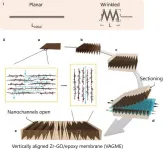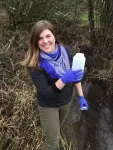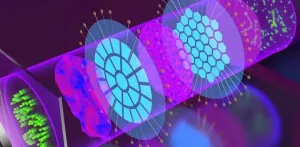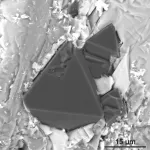Detailed tumour profiling
2021-01-21
(Press-News.org) Researchers from the University Hospitals in Zurich and Basel, ETH Zurich, University of Zurich and the pharmaceutical company Roche have set out to improve cancer diagnostics by developing a platform of state-of-the-art molecular biology methods. The "Tumor Profiler" project aims to derive the comprehensive molecular profile of tumours in cancer patients, which has the potential to predict the efficacy of a host of new cancer medications. It will therefore make it possible to offer treating physicians personalised and improved therapy recommendations.
Three years ago, the researchers began a large-scale clinical study involving 240 patients suffering from metastatic skin cancer (melanoma), metastatic ovarian cancer, or acute myeloid leukaemia. The thorough investigation of these patients' tumours provides the researchers with a comprehensive understanding of the cellular composition and biology of each tumour. The researchers recently published details of their study design in an article in the journal Cancer Cell.
Investigating at the single-cell level
What's new about the "Tumor profiler" study is that it harnesses a suite of advanced tumour-testing methods to gain new insights by exploring how these can be combined in a clinically meaningful way. The study ventures far beyond the current use of molecular biology methods practised in leading hospitals. "We've brought together all the cutting-edge technology available at ETH Zurich and the project partners. Working with physicians from Zurich and Basel, we've developed an advancement in oncology, one that serves the patients," says Mitch Levesque, professor at the University Hospital Zurich and one of the article's corresponding authors.
The scope of testing includes the cancer cells' DNA, RNA and proteins. Single-cell level data provides the researchers an understanding of each tumour's cellular diversity, which includes not only cancer cells, but also immune cells. "We examine the entire tumour and its microenvironment," says Andreas Wicki, senior physician at the University Hospital Zurich. Part of the analysis also includes functional tests, in which biopsies of the tumour are treated with drugs in the laboratory to see if the drugs work. Information from medical imaging and other patient data is also taken into account.
Informing treatment decisions
"We end up with vast amounts of data for each patient, which we prepare and analyse using data science methods," says Gunnar Rätsch, professor at ETH Zurich and another corresponding author of the publication. The Tumor Profiler findings are then made available to the treating physicians, who discuss them at the interdisciplinary tumour board sessions. Since in science, detailed molecular tests are referred to with terms with the suffix -omics (genomics, transcriptomics, proteomics), this approach which encompasses very many "omics areas" is called a multi-omics approach.
"We want the Tumor Profiler study to show that the widespread use of advanced profiling methods in oncology is not only possible but offers specific clinical benefits," says Viola Heinzelmann, Head of Gynecological Oncology at the University Hospital Basel, and a senior author of the study. This is why the study also focuses on whether and how molecular analyses may have influenced a physicians' treatment decisions.
In the long-term, the Tumor Profiler approach aims to expand treatment options for patients in terms of personalised medicine. This involves addressing the question of whether certain patients would benefit from medications that do not belong to the standard range of oncological treatments but are approved for other types of cancer.
Data collection for the Tumor Profiler study will end in two months' time, after which the research team will analyze the data and present the results.
INFORMATION:
This study was funded partly by Roche and partly by the participating universities and university hospitals-
ELSE PRESS RELEASES FROM THIS DATE:
2021-01-21
PROVIDENCE, R.I. [Brown University] -- When sheets of two-dimensional nanomaterials like graphene are stacked on top of each other, tiny gaps form between the sheets that have a wide variety of potential uses. In research published in the journal Nature Communications, a team of Brown University researchers has found a way to orient those gaps, called nanochannels, in a way that makes them more useful for filtering water and other liquids of nanoscale contaminants.
"In the last decade, a whole field has sprung up to study these spaces that form between 2-D nanomaterials," said Robert Hurt, a professor in Brown's School of Engineering and coauthor of the ...
2021-01-21
TROY, N.Y. -- Warnings about misinformation are now regularly posted on Twitter, Facebook, and other social media platforms, but not all of these cautions are created equal. New research from Rensselaer Polytechnic Institute shows that artificial intelligence can help form accurate news assessments -- but only when a news story is first emerging.
These findings were recently published in Computers in Human Behavior Reports by an interdisciplinary team of Rensselaer researchers. They found that AI-driven interventions are generally ineffective when used to flag issues with stories on frequently covered ...
2021-01-21
Among the materials known as perovskites, one of the most exciting is a material that can convert sunlight to electricity as efficiently as today's commercial silicon solar cells and has the potential for being much cheaper and easier to manufacture.
There's just one problem: Of the four possible atomic configurations, or phases, this material can take, three are efficient but unstable at room temperature and in ordinary environments, and they quickly revert to the fourth phase, which is completely useless for solar applications.
Now scientists at Stanford ...
2021-01-21
Delivering a minor electric shock into a stream to reveal any fish lurking nearby may be the gold standard for detecting fish populations, but it's not much fun for the trout.
Scientists at Oregon State University have found that sampling stream water for evidence of the presence of various species using environmental DNA, known as eDNA, can be more accurate than electrofishing, without disrupting the fish.
"It's revolutionizing the way we do fish ecology work," said Brooke Penaluna, a research fish biologist with the U.S. Department of Agriculture Forest Service who also has an appointment in OSU's Department ...
2021-01-21
If you believe you are capable of becoming the healthy, engaged person you want to be in old age, you are much more likely to experience that outcome, a recent Oregon State University study shows.
"How we think about who we're going to be in old age is very predictive of exactly how we will be," said Shelbie Turner, a doctoral student in OSU's College of Public Health and Human Sciences and co-author on the study.
Previous studies on aging have found that how people thought about themselves at age 50 predicted a wide range of future health outcomes up to 40 years later -- cardiovascular events, memory, balance, will to live, hospitalizations; even mortality.
"Previous ...
2021-01-21
BIRMINGHAM, Ala. - A 72-year-old woman was hospitalized with severe COVID-19 disease, 33 days after the onset of symptoms. She was suffering a prolonged deteriorating illness, with severe pneumonia and a high risk of death, and she was unable to mount her own immune defense against the SARS-CoV-2 virus because of chronic lymphocytic leukemia, which compromises normal immunoglobulin production.
But when physicians at the University of Alabama at Birmingham recommended a single intravenous infusion of convalescent blood plasma from her son-in-law -- who had recovered from COVID-19 disease ...
2021-01-21
Microscopy is the workhorse of contemporary life science research, enabling morphological and chemical inspection of living tissue with ever-increasing spatial and temporal resolution. Even though modern microscopes are genuine marvels of engineering, minute deviations from ideal imaging conditions will still lead to optical aberrations that rapidly degrade imaging quality. A mismatch between the refractive indices of the sample and its immersion medium, deviations in the thickness of sample holders or cover glasses, the effects of aging on the instrument--such deviations ...
2021-01-21
Contemporary robots can move quickly. "The motors are fast, and they're powerful," says Sabrina Neuman.
Yet in complex situations, like interactions with people, robots often don't move quickly. "The hang up is what's going on in the robot's head," she adds.
Perceiving stimuli and calculating a response takes a "boatload of computation," which limits reaction time, says Neuman, who recently graduated with a PhD from the MIT Computer Science and Artificial Intelligence Laboratory (CSAIL). Neuman has found a way to fight this mismatch between a robot's "mind" and body. The method, called robomorphic computing, uses a robot's physical layout and intended applications ...
2021-01-21
BOSTON - Regular aspirin use has clear benefits in reducing colorectal cancer incidence among middle-aged adults, but also comes with some risk, such as gastrointestinal bleeding. And when should adults start taking regular aspirin and for how long?
There is substantial evidence that a daily aspirin can reduce risk of colorectal cancer in adults up to age 70. But until now there was little evidence about whether older adults should start taking aspirin.
A team of scientists set out to study this question. They were led by Andrew T. Chan MD, MPH, a gastroenterologist and chief of the Clinical and Translational Epidemiology Unit at ...
2021-01-21
Diamond, like graphite, is a special form of carbon. Its cubic crystal structure and its strong chemical bonds give it its unique hardness. For thousands of years, it has also been sought after as both a tool and as a thing of beauty. Only in the 1950s did it become possible to produce diamonds artificially for the first time.
Most natural diamonds form in the Earth's mantle at depths of at least 150 kilometres, where temperatures in excess of 1500 degrees Celsius and enormously high pressures of several gigapascals prevail - more than 10.000 times that of a well-inflated bicycle tyre. There are different theories for the exact mechanisms ...
LAST 30 PRESS RELEASES:
[Press-News.org] Detailed tumour profiling





